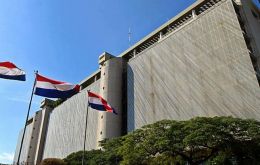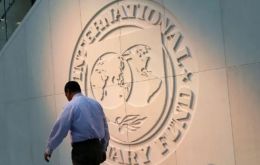MercoPress. South Atlantic News Agency
Economy
-
Thursday, October 17th 2024 - 11:36 UTC
Paraguay's Central Bank ups growth projections for 2024

Paraguay's Central Bank (BCP) has this week upped the South American country's economic growth projection for this year from 3.8% to 4%. On the supply side, the main upward revisions were in the livestock, trade, and tax sectors, while downward adjustments were recorded in electricity and water amid higher domestic demand in line with the good dynamics imports have been registering.
-
Thursday, October 17th 2024 - 06:13 UTC
Panama Canal posts significant setback in FY2024

The Panama Canal Authority (ACP) reported this week a 29.3% drop in passing ships during Fiscal Year 2024 as a result of the severe drought affecting the interoceanic crossing. A total of 9,944 transits were recorded this year, a significant setback from 14,080 crossings in 2023. A fiscal year runs from October 1 to September 30 of the following year.
-
Monday, October 14th 2024 - 22:06 UTC
Trio granted Economics Nobel Prize for delving into development asymmetries

Three researchers who delved into the asymmetries of how countries prosper differently were awarded the Economics Nobel Prize Monday, thus closing this year's round of announcements ahead of the Dec. 10 award ceremonies in Stockholm.
-
Monday, October 14th 2024 - 10:13 UTC
IDB announces loans for Argentina

Argentina's administration of President Javier Milei will be receiving loans worth US$ 3.8 billion from the Inter-American Development Bank (IDB), it was reported during the weekend. These funds will be allocated to various projects, energy subsidies, and social plans, it was explained.
-
Monday, October 14th 2024 - 08:15 UTC
Argentina's BCRA launching collector's AR$ 25 coins

Argentina's Central Bank (BCRA) announced a new AR$25 coin as a part of a joint venture with Spain, Portugal, and other countries in the region to highlight each nation's cultural diversity.
-
Saturday, October 12th 2024 - 10:16 UTC
IMF goes easier on heavily indebted countries such as Argentina

The International Monetary Fund (IMF) announced Friday a series of cuts on overcharges to countries heavily in debt, which, albeit moderate, could benefit Argentina among other nations. Such an initiative had been resisted in the past by Washington and other G7 nations but things have changed considerably at a global level.
-
Friday, October 11th 2024 - 10:19 UTC
Hurricane Milton leaves at least 12 dead in Florida

At least 12 people have been confirmed dead Thursday in the U.S. state of Florida, where Hurricane Milton made landfall as a Category 3 storm with maximum sustained winds of 115 mph from the Gulf of Mexico into the Atlantic Ocean, leaving millions without power and causing severe damage. According to PowerOutage.us, 2.63 million homes were still without power in Florida Thursday night.
-
Friday, October 11th 2024 - 09:30 UTC
Argentine inflation stands at 3.5% in September

Argentina's National Institute of Statistics and Census (Indec) announced Thursday that September's Consumer Price Index (CPI)stood at 3.5% for a yoy total of 209%. So far in 2024, inflation reached 101.6%, with housing, utilities, and fuels accounting for the largest increases. Thursday's figures represented a slowdown from August's 4.2%. The Core CPI, which records inflation excluding seasonal and regulated prices, stood at 3.3%.
-
Thursday, October 10th 2024 - 10:03 UTC
Italian Deputy PM pledges to help pull through EU-Mercosur FTA

Italy's Deputy Prime Minister and top diplomat Antonio Tajani told a group of Brazilian businesspeople in Sao Paulo Wednesday that his country was facing “a great opportunity” to strengthen its economic and commercial presence in Latin America, particularly through the EU-Mercosur free trade agreement that is still pending ratification.
-
Wednesday, October 9th 2024 - 08:32 UTC
Brazilian Senate gives nod to future BCB CEO

Brazil's Federal Senate Tuesday greenlighted by 66 votes to 5 the appointment of Gabriel Galípolo as the next Central Bank (BCB) CEO to succeed Roberto Campos Neto, who stems from former President Jair Bolsonaro's administration and whose term ends Dec. 31.
